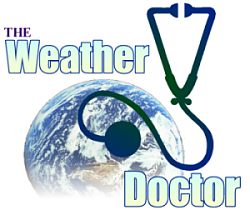 |
 |
| Home | Welcome | What's New | Site Map | Glossary | Weather Doctor Amazon Store | Book Store | Accolades | Email Us |
 | |||||||||
Weather Almanac for May 2007THE SMELLS OF WEATHERAhhh, May. With luck, the April showers have brought an outbreak of May flowers. My favourite Spring aroma is the smell of lilacs in bloom. The airs, however, are not always filled with flowery fragrance. I'm not just talking about that skunky air that makes up air pollution, or those foul emissions from natural sources such as swamps. I'm not even talking here about those wonderful smells coming from new mown hay, the sea or flowers. I am talking about weather conditions that have a characteristic odour. "Well," you say, "I know I can see the weather, I can feel it, I can hear it, but can I really smell weather?" My answer is a qualified "Yes." Qualified in that often the underlying source of the smell of weather comes from the soil, new-mown hay, flowers, or the ocean. But the reason we smell these better at times is due to changes in the atmosphere that brings these smells to our noses, and that is a function of the weather.
Particular smells associated with a change in wind direction may indicate coming weather changes, though this is often a local effect, that is, it is dependent on the location of the odour source to you. For example, if an east wind brings rain and a swamp lies to your east, the smell of the swamp may be a good indication of rain in the near future. Of course, you can, in some circumstances, work this backward. A particular smell might give you an indication of a specific wind direction blowing in your vicinity. There are other smell–weather correlations that have validity in sensing the coming weather. For ages, people have based weather lore on their sense of smell. Perhaps you have heard these sayings: "Flowers smell best just before a rain." "When ditches and ponds offend the nose, Look for rain and stormy blows." Many weather sayings are downright wrong, but others have a ring of truth. These smelly adages fall in the latter category for several reasons. First, warm and humid air enhances our sense of smell, the humidity carrying many odorous molecules to our noses. In most instances, warmer conditions beget more odours because the molecules that cause the odour sensation are more readily vaporized when it is warmer. And humidity is important because many odorous compounds must be connected to water molecules to be smelled. Our noses work best in moist conditions than in dry. From a meteorological perspective, it is well established that humidity increases as the threat of rain increases. Lowering barometric pressure and rising air currents are also indicators of coming precipitation, and they both enhance the transmission of natural smells far afield. When the wind blows from a given direction with an approaching weather system, we may smell the gases given off by distant wet plants and soil, or some other source, long before the rains move over us. We know that there are several species of bacteria that live in the soil that emit their spores when it rains. The impact of raindrops around these bacteria kick the spores into the air where they are wafted along for a great distance. Such spores have the musty odour that we often associate with coming rainfall.
The absence or mutting of strong odours can also be a weather indicator. Colder and drier conditions inhibit the release of smelly compounds and their ability to be detected by our noses, resulting in the air having a "clean" smell. Rising pressure may also inhibit odours from being released from the ground or surface water in great enough concentration to be detected by our noses. These atmospheric properties are often indicative of fair weather, so a clean smell to the outdoor air can give an indication of a coming clearing of wet weather. A heavy or prolonged rainfall may also washout many offending molecules from the air, leaving it clean-smelling like freshly washed clothes. The ultimate in cold and dry can be found during the winter when ice and snow dominate the weather. The winter is characterized by dormancy in plants and often frozen surfaces that further hide away potential odorous sources. (Of course, there are always potential odours from human sources — industry, restaurants, traffic, etc.) But these inhibitions do not prevent some people from "smelling" a snowstorm's approach. These olfactory-enhanced individuals likely are able to pick up on similar clues as are present with approaching rain, though the smells are much subtler, and likely missed by the rest of the population. So the next time you hear someone says "It smells like rain," you might keep that umbrella handy. Learn More About the Weather From These Relevant Books
|
|||||||||
 |
To Purchase Notecard, |
Now Available! Order Today! | |
 |
 |
NEW! Now |
The BC Weather Book: |


